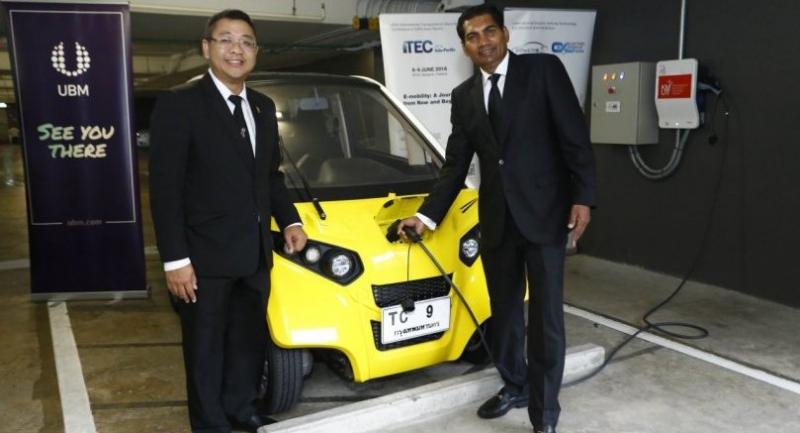Urgency urged on EV industry hub

THAILAND should not regard a free-trade agreement (FTA) with China that will liberalise trade in electric vehicles (EV) as a threat, but rather an opportunity to develop the Kingdom as a hub for the production and distribution of the vehicles, parts, and components across the region, says an international exhibitor with expertise in the EV industry.
The country would inevitably need to liberalise imports of electric vehicles from China under the Thailand-China FTA, which is scheduled to bring down import tariffs for EVs to zero in January next year, said M Gandhi, managing director of UBM Asia (Thailand) Co Ltd, which will host the International Electric Vehicle Technology Conference and Exhibition (iEVTech2018 & Electric Vehicle Expo 2018) in Thailand next year.
“Thus the Thai government should come up with concrete and clear strategies to develop Thailand as not only a regional centre for EV manufacturing, but also a distribution centre, as Thailand has strong potential to become a regional hub for EVs with many advantages,” Gandhi said.
He said that FTAs, including the pact with China, cannot be seen in isolation but as part of Thailand’s EV strategy.
“If the EV strategy is to encourage local manufacturing of a certain range of affordable EVs, locally assembled vehicles should have regulatory or policy advantages, while further incentivising usage of local content,” Gandhi said.
"Imports will allow healthy competition and the building of market size quickly and that will, in turn, speed up the critically needed infrastructure such as charging stations.
“However this cannot be done at the expense of local manufacturing investments in EV. A total free for all in EV imports in all categories may not be wise in building Thailand as an EV manufacturing hub in Asean.”
Gandhi said the government should find a balanced strategy to encourage domestic demand for EV, while also promoting more investment for local producers to make EVs, parts, and components to supply the market. “Thailand could then become a centre of the EV industry in the Asean region.”
Since October 2003, the Thailand-China FTA has been enforced to gradually reduce tariffs for trade in goods starting at 20 per cent. After that, both countries have agreed to bring down tariffs to zero for more than 90 per cent of trade in goods in 2010, while the tariffs on products including electric vehicles, batteries, and related components that are categorised as sensitive should be reduced to 0-5 per cent in 2018.
“Thus, as of early January, Thailand must waive import tariffs for EVs from China, where the price of EVs is quite competitive compared with other countries,” Gandhi said.
To promote Thailand as a hub of the EV industry, Gandhi said the government “should adopt its successful experience in promoting pick-up truck manufacturing and distribution worldwide.
“The Thai government should come up with not only tax incentives to promote investment in manufacturing, but also ensure that the country has provided adequate facilitators such as charging stations for serving EV users nationwide,” Gandhi said.
He said the EV industry should come under the national strategies, as the trend for EV use worldwide will rise sustainably.
“As soon as Thailand can announce our potential as an EV hub, the country will able to take greater benefit from the emerging demand for EVs worldwide,” he said.
According to a study by the International Energy Agency, the number of registered EVs worldwide was 750,000 units in 2016, while the world has a stock of 2 million units. In 2040, the number of EVs globally will rise to 35 per cent from of all vehicles, the agency said.
Yossapong Laoonual, president of the Electric Vehicle Association of Thailand, said Thailand has strong potential to become a centre of EV production and distribution, given the government’s policy to promote the investment in the sector.
Yossapong cited the Finance Ministry’s move to reduce excises for EVs to 2 per cent, while the Board of Investment of Thailand has come up with an incentive to promote investment for three kinds of EVs: hybrid electric vehicles, plug-in hybrid electric vehicles battery electric vehicles.
Moreover, the Energy Ministry will help establish charging stations nationwide.
Thailand has about 70 stations, and targets to have 300 charging stations within the next five years. In 2036, the government aims to have 690 charging stations and 1.2 million electric vehicles nationwide, Yossapong said.





